Skoda Fabia VS Toyota Prius – Specs, Efficiency & Price Comparison
Which model is the better choice – the Skoda Fabia or the Toyota Prius? We compare performance (150 HP vs 223 HP), boot capacity (380 L vs 284 L), efficiency (4.90 L vs 0.50 L), and of course, the price (16900 £ vs 39400 £).
Find out now which car fits your needs better!
The Skoda Fabia (Hatchback) is powered by a Petrol engine and comes with a Manuel or Automatic transmission. In comparison, the Toyota Prius (Hatchback) features a Plugin Hybrid engine and a Automatic gearbox.
When it comes to boot capacity, the Skoda Fabia offers 380 L, while the Toyota Prius provides 284 L – depending on what matters most to you. If you’re looking for more power, you’ll need to decide whether the 150 HP of the Skoda Fabia or the 223 HP of the Toyota Prius suits your needs better.
There are also differences in efficiency: 4.90 L vs 0.50 L. In terms of price, the Skoda Fabia starts at 16900 £, while the Toyota Prius is available from 39400 £.
Compare all the key specs now and find out which model fits your lifestyle best!
Skoda Fabia
The Skoda Fabia presents itself as a practical and stylish hatchback, perfect for urban driving and beyond. Its interior is designed with comfort and functionality in mind, offering ample space and intuitive controls. With a focus on efficiency, the Fabia provides a smooth driving experience, complemented by its crisp and modern exterior design.
details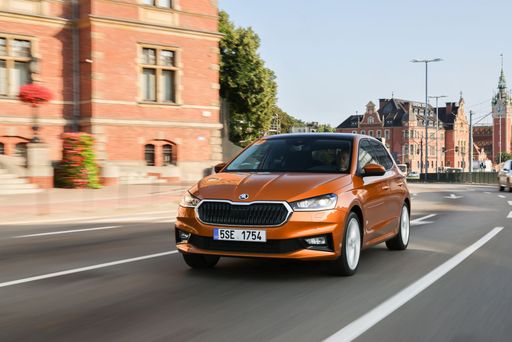 @ Skoda Presse Deutschland
@ Skoda Presse Deutschland
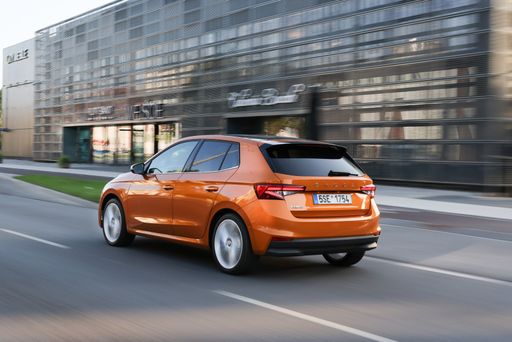 @ Skoda Presse Deutschland
@ Skoda Presse Deutschland
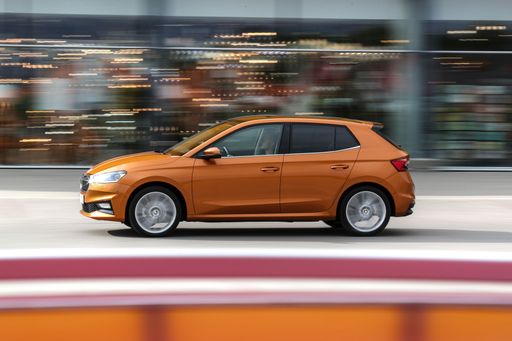 @ Skoda Presse Deutschland
@ Skoda Presse Deutschland
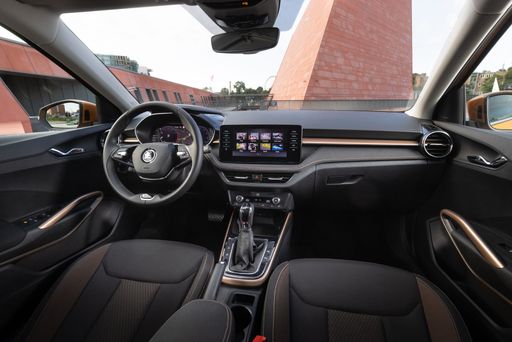 @ Skoda Presse Deutschland
@ Skoda Presse Deutschland
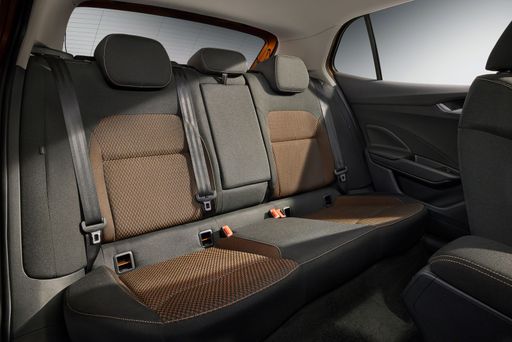 @ Skoda Presse Deutschland
@ Skoda Presse Deutschland
Toyota Prius
The Toyota Prius stands as a pioneer in the realm of hybrid vehicles, offering an eco-friendly driving alternative with its innovative technology. Its aerodynamic design and comfortable interior make it a practical choice for those looking to reduce their carbon footprint without sacrificing style. Additionally, the Prius boasts a reputation for reliability and efficiency, contributing to its lasting popularity among environmentally conscious drivers.
details @ Toyota
@ Toyota
 @ Toyota
@ Toyota
 @ Toyota
@ Toyota
 @ Toyota
@ Toyota

|

|
|
|
|
Costs and Consumption |
|
|---|---|
|
Price
16900 - 26000 £
|
Price
39400 - 45800 £
|
|
Consumption L/100km
4.9 - 5.3 L
|
Consumption L/100km
0.5 - 0.7 L
|
|
Consumption kWh/100km
-
|
Consumption kWh/100km
-
|
|
Electric Range
-
|
Electric Range
72 - 86 km
|
|
Battery Capacity
-
|
Battery Capacity
-
|
|
co2
112 - 119 g/km
|
co2
12 - 17 g/km
|
|
Fuel tank capacity
40 L
|
Fuel tank capacity
40 L
|
Dimensions and Body |
|
|---|---|
|
Body Type
Hatchback
|
Body Type
Hatchback
|
|
Seats
5
|
Seats
5
|
|
Doors
5
|
Doors
5
|
|
Curb weight
1133 - 1238 kg
|
Curb weight
1620 - 1630 kg
|
|
Trunk capacity
380 L
|
Trunk capacity
284 L
|
|
Length
4108 mm
|
Length
4599 mm
|
|
Width
1780 mm
|
Width
1782 mm
|
|
Height
1459 mm
|
Height
1470 mm
|
|
Payload
442 - 455 kg
|
Payload
365 - 375 kg
|
Engine and Performance |
|
|---|---|
|
Engine Type
Petrol
|
Engine Type
Plugin Hybrid
|
|
Transmission
Manuel, Automatic
|
Transmission
Automatic
|
|
Transmission Detail
Schaltgetriebe, Automat. Schaltgetriebe (Doppelkupplung)
|
Transmission Detail
-
|
|
Drive Type
Front-Wheel Drive
|
Drive Type
Front-Wheel Drive
|
|
Power HP
80 - 150 HP
|
Power HP
223 HP
|
|
Acceleration 0-100km/h
8 - 15.7 s
|
Acceleration 0-100km/h
6.80 s
|
|
Max Speed
175 - 222 km/h
|
Max Speed
177 km/h
|
|
Torque
93 - 250 Nm
|
Torque
-
|
|
Number of Cylinders
3 - 4
|
Number of Cylinders
4
|
|
Power kW
59 - 110 kW
|
Power kW
164 kW
|
|
Engine capacity
999 - 1498 cm3
|
Engine capacity
1998 cm3
|
General |
|
|---|---|
|
Model Year
2024
|
Model Year
2023
|
|
CO2 Efficiency Class
D, C
|
CO2 Efficiency Class
B
|
|
Brand
Skoda
|
Brand
Toyota
|
Skoda Fabia
The Skoda Fabia: Precision Meets Practicality
The Skoda Fabia has long been a favourite in the compact car segment, and the 2024 version continues to uphold its reputation for delivering a perfect blend of efficiency, performance, and affordability. With a fresh design and advanced technological innovations, the Fabia is set to impress both new drivers and loyal enthusiasts alike.
Under the Bonnet: Engine Specifications
At the heart of the Skoda Fabia lies a range of efficient petrol engines tailored to meet diverse driving needs. The engine line-up includes three-cylinder and four-cylinder options, offering power outputs between 80 PS to 150 PS, corresponding to 59 kW to 110 kW. These engines strike an ideal balance between spirited performance and fuel economy, boasting consumption rates between 5 to 5.5 litres per 100 km, depending on the variant.
Transmission Options: Manual and Automatic
Drivers can choose from manual or automatic transmissions based on their preference for driving dynamics. The manual gearbox provides a traditional, engaging driving experience, while the advanced automatic dual-clutch transmission (DSG) offers seamless gear changes for a more relaxed commute.
Design and Dimensions: Compact Yet Spacious
The Fabia's exterior design remains quintessentially Skoda—sharp, elegant, and functional. The car measures 4108 mm in length, 1780 mm in width, and stands 1479 mm tall. Despite its compact footprint, the interior is surprisingly spacious, comfortably seating five and providing a commodious boot space of 380 litres.
Performance Metrics: Speed and Agility
Acceleration varies between 8 to 15.1 seconds for a 0-100 km/h sprint, with a maximum speed of 179 to 225 km/h, making it a versatile choice for urban and highway driving. Furthermore, the front-wheel-drive system ensures excellent traction and handling in various road conditions.
Fuel Efficiency and Environmental Impact
Skoda continues its commitment to sustainability with the Fabia, achieving CO2 emissions between 113 to 124 g/km. These figures not only highlight the vehicle's eco-friendly credentials but also result in lower running costs for the consumer, making it an astute financial choice.
Trim Levels and Customisation
The Fabia is available in six distinct trim levels: Drive, Essence, Selection, Drive DSG, Monte Carlo, and Monte Carlo DSG. Each variant offers its own set of features and customisation options, allowing buyers to tailor the vehicle to their specific taste and lifestyle needs.
Conclusion: A Compact Car with Much to Offer
In conclusion, the Skoda Fabia stands out in the compact car segment with its remarkable balance of performance, practicality, and affordability. With prices ranging from €19,320 to €29,840, it offers great value for money, appealing to a wide range of car buyers seeking reliability and innovation in their daily drive.
Toyota Prius
The All-New Toyota Prius: Revolutionising Efficiency and Performance
The Toyota Prius, a name synonymous with hybrid innovation, has once again shown why it remains at the forefront of eco-friendly automotive technology. The latest models have enhanced technical features and innovations, setting new standards for efficiency and driving experience.
Hybrid Performance: A Leap Forward
The latest Prius models employ a sophisticated 2.0 litre Plug-in Hybrid system that flawlessly melds petrol and electric power. With a power output of 223 PS, it propels the Prius with impressive dynamism, reaching 0-100 km/h in just 6.8 seconds. This performance-oriented aspect of the Prius does not compromise on efficiency, with an astonishing fuel consumption ranging from 0.5 to 0.7 L/100km.
Electric Range and Efficiency
One of the key highlights of the new Prius is its substantial electric-only range. Depending on the variant, it can travel between 72 to 86 km on electric power alone, making it an ideal choice for urban commutes where zero emissions are preferred. The hybrid system's CO2 emissions are remarkably low, between 12 and 17 g/km, contributing to its CO2 Efficiency Class B rating.
Engineering Excellence with CVT
The Prius is equipped with a state-of-the-art Continuously Variable Transmission (CVT), ensuring a smooth and efficient drive. This advanced transmission supports the front-wheel-drive layout, delivering power seamlessly and enhancing driving pleasure without sacrificing fuel economy.
Stylish Design and Comfort
Designed as a sleek five-door hatchback, the Prius offers a comfortable and spacious interior with seating for five passengers. It measures 4599 mm in length, 1782 mm in width, and 1470 mm in height, offering a practical balance of size and comfort. The boot space, while tailored for the hybrid battery, still provides a decent 284 litres of storage.
Cost Efficiency
The running costs of the Prius are competitive, with monthly expenses estimated between €1064 and €1188, and cost per kilometre ranging from 42.6 to 47.5 cents. Its efficient design results in a maximum speed of 177 km/h and a practical fuel tank size of 40 litres, ensuring less frequent stops on longer journeys.
Conclusion: The Prius Legacy Continues
The Toyota Prius continues to lead by example in the realm of hybrid technology. Combining impressive power with unmatched efficiency and a sophisticated driving experience, it is clear that the Prius remains a compelling choice for the environmentally conscious driver. Its innovative features and favourable cost metrics only bolster its appeal in the modern automotive landscape.
The prices and data displayed are estimates based on German list prices and may vary by country. This information is not legally binding.
